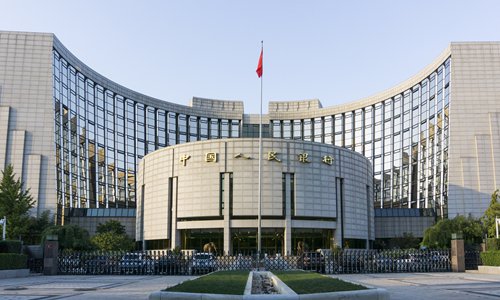
The headquarters of the People's Bank of China in Beijing Photo: IC
Three Chinese government bodies have announced draft measures that will further equalize treatment for overseas and domestic bond investors, while offering convenience for overseas institutional investors to allocate yuan-denominated bond assets.
The new regulations, released by the People's Bank of China (PBC) along with two other departments, stipulate that overseas institutions that want to enter China's inter-bank bond market no longer need to apply for each individual bond trade, but only need to make general applications for bond investment qualifications to the PBC or its Shanghai branch.
The regulations also allow overseas institutions to invest in the Chinese mainland's exchange-listed bond market either directly or via bond link mechanisms.
Meanwhile, the new regulations unify access standards for overseas bond investors and encourage them to participate in China's bond market as medium- and long-term investors. The new regulations also apply to investors from Hong Kong, Macao and the island of Taiwan.
The draft rules formalize the central bank's effort to deregulate the nation's bond market and push for a rules-based market, Wu Jinduo, head of fixed income at the research institute of Great Wall Securities, told the Global Times on Wednesday.
Allowing for unified access standards and improving the procedures required for market entry will facilitate overseas institutional investors' allocation of yuan-denominated bond assets, a vital part of the nation's push to globalize its currency, Wu explained, noting that the latest move bodes well for the gradual creation of a bond market that can match the nation's strength as the world's second-largest economy.
China has been consistently opening up its financial sectors to overseas investors, with measures such as scrapping foreign ownership limits, which have sparked overseas institutions' interest in financial investment in mainland markets. This seems especially true in the case of bond, as overseas investors have increased holdings of mainland bonds in every month since December 2018.
While negative nominal or actual yields on government bonds have become the norm across many economies, China keeps its bond yields in positive territory, meeting the allocation needs of institutional investors, according to Wu.
International investors hold a massive amount of Chinese government bonds and policy-based financial bonds, and international credit rating agencies have long classified China as a high-rated sovereign issue, meaning a default is only remotely possible, she said, adding the addition of Chinese government bonds in major global indices is indicative of the recognition of onshore bonds globally.
Also, more overseas financial institutions are establishing subsidiaries in China to test the waters. Recently, Japan-based Daiwa Securities received approval from the China Securities Regulatory Commission to establish a majority-owned joint venture in China, becoming the seventh overseas securities firm to set up a majority-owned joint venture in the mainland.




